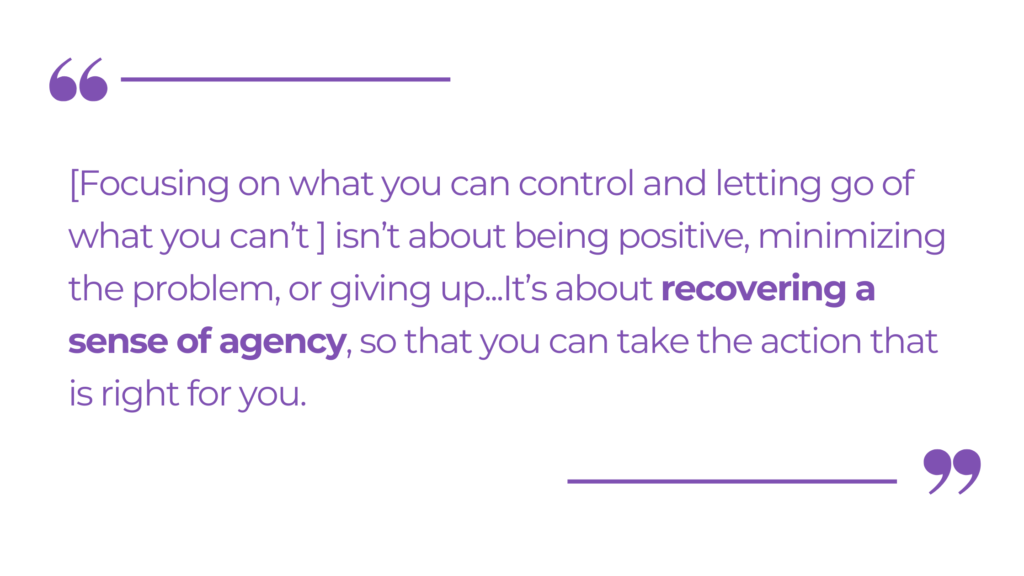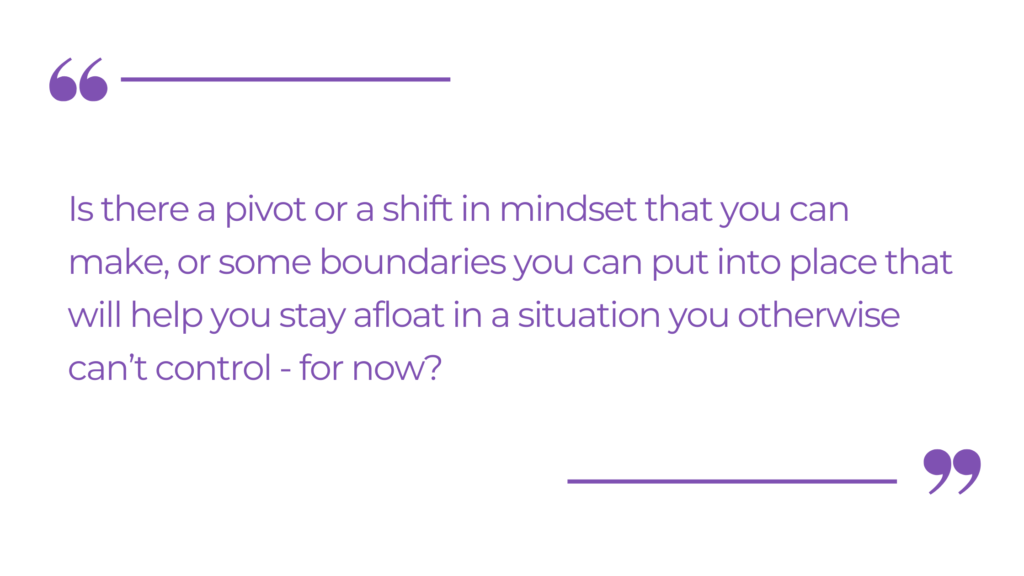
What To Do When Things Are Not In Your Control
My apartment flooded last month, and it wasn’t because of the weather.
It was just a regular weeknight and I was getting ready for bed, when suddenly, I started hearing drops of water.
That’s odd.
The sound led me to – of all places – my closet, where a puddle had already formed on the ground. Instinctively, I grabbed a stock-pot from my kitchen to try to catch the drip. But by the time I got back, water was coming from the ceiling down across the full length of my sliding closet doors.
I didn’t have a pot long enough for that.
The rest of that evening was a blur. A pipe had burst in the unit above me, and eventually water streamed from my bathroom ceiling, air vent, and from my bedroom ceiling fan – landing directly onto my bed.
The “rain” in my apartment took an hour to stop, but the aftermath upended my plans for the next month and a half.
Talk about something I couldn’t control – and definitely couldn’t predict.
I wasn’t going to write about it here because it felt so random. However, the reality is that work and career – which is our focus here – is only one part of my life and yours. And sometimes, random things happen in life.
While dealing with the aftermath of the flood in the following weeks, I couldn’t help but notice some parallels. Whether in our personal lives or careers, there are always things that are not in our control. And this thought kept nagging at me as something to be written out…so here we are.
I’m thinking of those of you who are getting ready to defend and graduate and are trying to find a job in industry. The job market is tough (at the time I’m writing this). It feels like every other day tech companies are taking cost-cutting measures.
Or perhaps it’s something else for you:
- You have a job, but it isn’t panning out the way you thought it would.
- You’re waiting a promotion that should have happened, but hasn’t.
- You’ve been job-hunting for months and still have no leads.
- Or, it suddenly decided to rain in your apartment on a random evening at 11:37 PM.
Whatever the situation is that is not in your control – it is maddening, saddening, and stressful. And it’s never easy. Here are some of my recent thoughts about what to do when things are not in your control (courtesy of my recent apartment flood).
1. It’s okay to be upset
In the aftermath of the pipe burst, there were so many things to take care of. The shock of an unexpected flood was part of it, but I also knew there would be an onslaught of phone calls, emails, and logistics. It was going to be stressful.
I struggled with a couple of different emotions. At first, I was angry that it happened to me. It wasn’t a good time (not that there ever is a good time). And then I felt guilty for feeling angry when “it could have been worse.”
But, just because it could have been worse doesn’t invalidate how you feel about your situation.
For you, it might not be an apartment flood, but something else that didn’t turn out the way you wanted.
You don’t have to automatically feel ok about your situation – whether or not it could have been worse. Being upset is a natural and human emotion.
Suppressing those feelings with ‘it’s fine’ when things are absolutely not fine will lead to more stress and discomfort. It’s important to acknowledge the situation for what it is: an unfortunate event that was not in your control.
2. Hold your plans loosely
We love predictability because it gives us a sense of stability. But when things are not in our control, we can’t plan very far.
As someone who loves planning and executing said plans – losing my plans overnight was arguably the real disaster.
I had just settled into a new rhythm of life and work. My sister was supposed to stay with me that weekend. I was planning to host a much-anticipated girls’ weekend later in the month.
Instead, now I was moving out of my apartment for repairs, and no one could clearly tell me for how long.
I spent all my spare energy and time dealing with the evolving situation. First, it was a matter of packing up my belongings; later, it was hashing out logistics around insurance and repairs. During that time, my weekly routines dissolved because I was just trying to stay afloat.
I wonder how many of you are feeling this way about plans that fell through or were interrupted by something unexpected. It’s annoying, isn’t it?
Some of us are better at being flexible than others. I’ll be the first to admit that I’m not naturally good at it… but I’m learning.
Sometimes you have to let go of your plans instead of gripping them tighter. Letting go is not a sign of failure. Sometimes, things are just not in your control, and it means learning to adapt and hold your plans a little more loosely.

3. Do one thing at a time
When things are not in your control, it can quickly go from frustrating to overwhelming.
When it was raining in my bedroom, I frantically emptied everything into my living room. As a result, my living room looked as cluttered as I felt inside. It was an organizational nightmare, and I certainly didn’t want to pack it up for repairs.
To top it off, my flood coincided with a busy time at work. Chaos followed me at home and at work, and I felt like I couldn’t catch a break anywhere. As someone who is used to multi-tasking, my brain reached a limit and it was tough to keep everything organized.
I realized the best I could do for myself was to focus on what was right in front of me. At work, this meant getting through one task at a time. At home, instead of staring at the entire mess I had to pack up, it was more manageable to zoom in and tackle one box at a time.
This was not a time for the big picture, because the big picture was too overwhelming to deal with.
If you are in an overwhelming situation, breaking a big problem into smaller pieces can make it less daunting. Each piece or segment may seem trivial. But, some progress is always better than no progress – and it all adds up in the end.
4. Don’t make any rash decisions
Stress almost always accompanies events that are out of your control. When you’re stressed or upset, it’s easy to find something or someone to blame, or to find a quick way out of your discomfort.
In the aftermath of the flood, I had to pack up my belongings over the course of a weekend. It was like I was moving out, except I had waaay less time than I normally would set aside if I was the one planning to move out.
My gut reaction? I wanted to throw everything away. All of it.
While tossing everything might be a funny example now – it was a “solution” to my problem, especially when I was stressed and didn’t want to deal with it.
Perhaps you can draw parallels to a different action you wanted to take that was influenced by a stressful or unexpected event.
Did a coworker or manager make a snide remark that made you want to quit? Or maybe a job interview you tried hard for fell through (again), and you want to give up altogether?
This is not to shame you about your situation, nor is it to automatically rule out any solutions you come up with when things are stressful. However, I am saying to give yourself time to think things through before acting on your choice.
Let things cool down. Run it by a trusted friend or family member to get a second opinion. Sort it out and clearly name what’s influencing your decision.
Knowing that it’s a stressful time, adjust accordingly and give yourself time and mental space to reassess the full picture.
5. Make a list of what is or is not in your control
When we encounter situations that are not in our control, we often feel powerless.
Packing up and moving out on short notice made me feel like I was being uprooted against my will (even though it was to ultimately fix my apartment).
While this situation was no one’s intentional fault, it doesn’t change how disorienting it felt being on the receiving end of something that’s out of my control.
What I found most helpful was to list what I could or could not control. I could choose my accommodations for the upcoming weeks of my nomad life. I could choose what to keep on my plate and what to table for later. I could choose where to expend my energy, and where to save it for now.
For the things I couldn’t control – I had to learn to let it go, instead of wasting more energy and emotion fighting against something I couldn’t change.
Maybe you’re faced with something else you can’t change: a troubling coworker or supervisor? A system or culture that doesn’t recognize or value what you bring to the table?
The real question is: what can you control? Maybe it’s how you react to an unfair situation. Or taking steps towards leaving a place that doesn’t fit you anymore.
To be clear: this isn’t about being positive, minimizing the problem, or giving up. Chances are, the problem is real. It’s about recovering a sense of agency, so that you can take the right action for you.
Sometimes powerlessness is what makes you feel stuck. Even if there is something particular that is out of your control, find the things you can control that can help you regain a sense of agency.
Whenever you’re stuck, there’s always something you can do. Even if it doesn’t change your situation directly, it can help you gain the confidence that you can take action and remind you that you won’t be stuck forever.

6. Make time to rest
When things are not in my control – I often fixate on fighting it. I throw everything I’ve got at it to make it “not a problem”. As a result, rest ends up on the back-burner.
With my flood situation, I knew my schedule was upended, but I didn’t want to give anything up. I wanted everything to be business as usual because the things on my calendar were important to me.
Although my tendency is to push through, realistically, I had to re-evaluate what I could manage during this unplanned, hectic time. It required consciously cutting non-essential things – even if they were good things – so that I could rest.
When you encounter situations that are stressful and not in your control – you and your well-being are your biggest resource.
What we don’t always see is that taking care of yourself is productive. Why? Because the more stable and rested you are, the better you will be at handling whatever unexpected stresses get thrown your way.
Take this as your reminder to be intentional about making time to rest and recover. It’s more important than ever, especially if you’re in a season where things feel chaotic. It might be letting your precious agenda slide, even if just for now.
Listen to your body and learn when it’s telling you to rest instead of push through.
7. Ask for help
I had never been through a home flooding before; and I hope you never have to either.
That meant I had no idea what I needed to do in the aftermath, especially when it came to documenting things for insurance purposes and how to navigate conversations where everyone has a different agenda.
When you encounter a situation that is not in your control – especially one that you don’t have any experience with – ask for help! Don’t try to push through on your own. Chances are, someone has been through something similar and knows how to handle it.
Having people in your corner makes a world of difference when you’re dealing with the stress of things that are out of your control. My family and friends were my external voices of reason, emotional support, and friendly faces during this rough patch.
By the way – if you’re a PhD working in industry and it’s 1) not what you expected to be, or 2) you’re not sure how to navigate a specific situation – I want you to know you’re not alone. I’ve been there; I know how isolating it can be and would love to help.

8. Make the most of what you have
You might not have what you want right now because of something that is not in your control. But instead of focusing on that, it may help to pause to take a look at what you DO have.
My college friends and I planned for a girls’ weekend at my place when they were in town. I had been looking forward to it all month. But of course, when the flood happened, plans had to change.
I couldn’t host in my home like I wanted, but my friends came to stay at my Airbnb instead. We still had a fun sleepover! I didn’t get to cook for them (which is something I do when I have people over), but we explored a neighborhood that was new to all of us and had a fun stay-cation.
It turned out to be one of the highlights of my nomad life, and I was so grateful they came just to be with me.
Did it make my flood situation “good”? No. But it was something positive that I could appreciate about an otherwise inconvenient experience.
Is there an experience or situation that feels less than ideal in your life or career right now? Perhaps it’s a workplace that is evolving in a way you can’t control or no longer fits you. Yet, you have to stay put where you are – even if you don’t like it – because there’s no clear exit yet.
Is there something in your current job or situation that you can find ways to enjoy or appreciate? Is there a pivot or a shift in mindset that you can make, or some boundaries you can put into place that will help you stay afloat in a situation you otherwise can’t control – for now?
(Note – I’m assuming this isn’t a toxic situation that is unsafe for you. If it is, I sincerely hope you’re able to reprioritize and remove yourself from the situation first.)
It doesn’t change your ultimate reason for wanting to leave or make everything better – but it could make the waiting a little more bearable while you figure out your next steps.

9. Give yourself grace
When something is not in your control, it’s natural to wonder if you should have seen it coming. Sometimes we trap ourselves in the list of “should’s”.
“I should have lived in an apartment that was owned by a business. Then I wouldn’t have had to coordinate so many of the repairs myself….it wouldn’t get dragged out as long.”
“I should have done spring cleaning last year so that packing during this disaster would have been more manageable.”
“I should have seen it coming.” You can fill in the blank – whatever “it” is.
If you dig deep enough, there’s always something you could have done differently. Hindsight is always 20-20. Maybe it would have helped you avoid the problem. Maybe not. The truth is that you might never know.
BUT, you did what you thought made the most sense at the time. It may not be perfect, and that’s ok. Use your hindsight instead as a way to learn from experience and inform what you might do differently the next time something similar happens.
10. Stay focused on what matters
When things are not in your control, sometimes it can feel like everything gets thrown for a loop. Emotions run high and patience runs low. Everything seems a little extra chaotic.
That’s how I felt about my apartment repair process. It was a multi-way coordination between myself, my landlord, my neighbor, repairmen, and insurance. And everyone involved had their own agenda.
Sound a little like the workplace? I thought so too.
In my flood example, my tipping point happened when I returned to my apartment and found that my closet was “fixed” – BUT they installed the closet rod several feet lower than where it used to be.
I was furious. I couldn’t hang my pants, long coats, or dresses because the rod was improperly installed that low.
Should I let it go and just work around the non-functional closet? Should I say something – knowing that it would take yet another round of emails, phone calls, documenting what went wrong, and how to make it right? Not to mention delaying when I can move back in….
For you, maybe my closet is a silly, non-issue; but it mattered to me. And I’m glad I pushed to have it re-done, instead of bending over backwards to try to make it work some other way.
Sometimes, that’s how workplaces are too, right? You, your manager, and your coworkers all have different agendas. Sometimes they’re aligned, but not always. It would be unrealistic to expect things to always be in your favor or control.
But for the things that do matter to you – know what they are, and make the effort to advocate for yourself. It may not be feasible or smart to fight everything, but some things are worth fighting for.
Be clear on what is non-negotiable for you and stay true to that. If you don’t – it won’t be aligned with what you want in the long term and may cause issues in the future.

11. Remember that this situation isn’t forever
…But it sure can feel like forever, doesn’t it?
I stayed in 8 different accommodations over the month of March and the first half of April. I was living out of a suitcase and feeling like a basketcase. The thing I kept reminding myself was that this chaos wouldn’t be forever.
I didn’t know exactly when it would be over. Maybe that’s the mental space you’re in, too.
A related question you may be asking is: “When? When will it be my turn?” Whether that’s…
- …to finally graduate / defend.
- …to get the job you want.
- …to get the promotion you’ve been waiting for.
The situation and timeline might not be something that’s in your control. But remember that it won’t stay this way forever. Patiently take on one day at a time. Make one step forward, even if it feels small.
When you’re going through the thick of it, it’s tough; but those consistent steps matter and will add up.
If life is throwing you curveballs right now, I hope you find some encouragement and strategies for what to do when things that are not in your control.
Sometimes, plans get derailed, whether it’s a job search that’s taking longer, a workplace that’s no longer a good fit, or a suddenly flooded apartment.
However, it’s how you handle the things that are not in your control that matters. It’s about learning to stay flexible, owning the choices that are in your control, and remembering that it won’t be chaotic forever.
You’re doing what you can, hanging in there, and weathering the storm – whether it’s in your workplace or your life (or your apartment). And that is enough for now.




Add A Comment